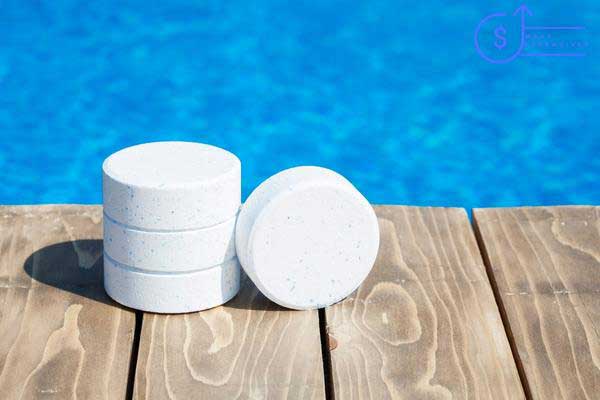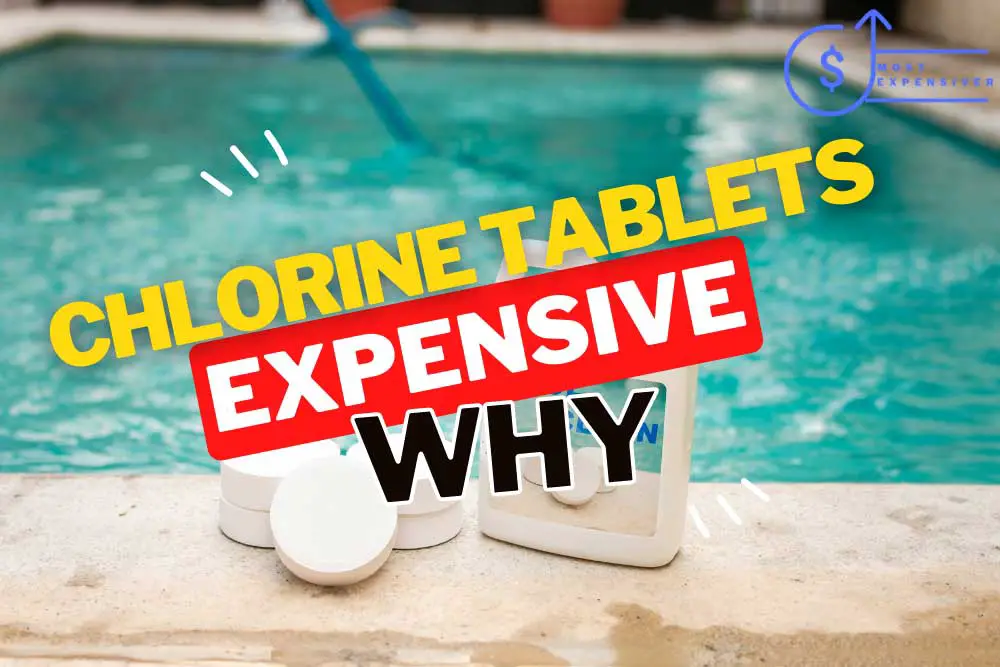Chlorine tablets are a very important part of swimming pool maintenance. They play an essential role in keeping the pool water clean and free of bacteria and other contaminants. Due to their importance, they are also quite expensive.
Chlorine tablets require regular replacement in order to maintain effective water sanitation levels in a pool. Buying them frequently can become quite costly over time, making it important to purchase only the most suitable type for your particular pool needs.
Why are chlorine tablets so expensive? Chlorine tablets are expensive because the cost of chlorine tablets depends on several factors, like the size and type of tablet, the composition of the chemicals used to create them, and the brand or manufacturer. Stabilized chlorine tablets typically cost more than unstabilized ones due to their higher concentration levels and longer shelf lives. Some brands may also be more expensive than others due to higher manufacturing costs or greater demand.
Chlorine tablets are a popular and effective way to keep swimming pools clean and safe, but their relatively high price may come as a shock to many. Understanding why chlorine tablets cost so much compared to other pool maintenance supplies can be difficult.
In this article, we will discuss the factors that contribute to these prices, such as the production process, transportation costs, and availability of materials. We’ll also explore cost-effective alternatives that offer similar results. With this knowledge, readers will have the information they need to make informed decisions about their pool maintenance needs.
Why Are Chlorine Tablets So Expensive
You may be surprised to see how much chlorine tablets cost when compared to other pool maintenance supplies. Understanding why this is the case can be tricky, so here we’ll provide you with all of the possible causes for the cost of chlorine tablets. Despite their relatively high expense, they remain a popular and effective way to keep swimming pools disinfected and safe.
1. Supply and Demand
Supply and demand are two of the main factors that influence the price of chlorine tablets. If there is a large demand for chlorine tablets, but a limited supply, then the cost of the tablets will increase. This can be due to other companies not being able to produce enough chlorine tablets or because of an increase in water contamination and water treatment needs.
2. Quality of Materials Used
The quality of the materials used for chlorine tablets can have a big impact on their price. These materials need to be safe and highly effective for long-term use, so manufacturers are likely to spend extra money to ensure good quality. This means that higher-quality materials can lead to an overall increase in the cost of production, which will then be passed on to consumers.
3. Cost of Manufacture
The cost of manufacture for chlorine tablets is a major factor in their high price. This includes the cost of raw materials, as well as labor and energy costs. It also includes any additional processing or treatments that need to be done to the tablets before they can be sold. All of these costs add up quickly, making chlorine tablets expensive overall.
4. Packaging Expenses
Packaging expenses can play an important role in the cost of chlorine tablets. Many manufacturers use costly packaging materials such as plastic or glass containers, labels, and other materials to ensure that the tablets are kept safe and secure during transport. Additionally, some manufacturers may also charge for labor costs associated with assembling and packing the product for sale. All of these costs will be included in the final price of chlorine tablets, making them more expensive than one might expect.
5. Advertising Costs
Advertising costs are an essential part of the production and distribution process for chlorine tablets, as it helps to spread awareness of the product and allows companies to reach potential customers. Without a proper advertising budget, chlorine tablets may not be able to get their message out there or compete in the marketplace. As such, manufacturers must factor in these costs when determining final prices for consumers.
6. Overhead Charges
Overhead charges refer to the costs associated with running a business, such as rent, utilities, and staff salaries. When it comes to chlorine tablets, these charges often include the cost of necessary safety equipment for handling and storing the chlorine tablets as well as other materials related to production. This can add up and make chlorine tablets more expensive.
7. Shipping and Delivery Costs
Shipping and delivery costs can have a big impact on the price of chlorine tablets. The cost to transport chlorine tablets from the manufacturer to the end user is usually factored into the overall cost of the product, so this can be an expensive process that drives up prices. This expense is especially true for international orders, where customs duties may also be applied.
8. Taxes and Duties
Taxes and duties are unavoidable cost factors when it comes to purchasing chlorine tablets. Depending on the country, certain taxes, tariffs, and duties must be paid in order to bring chlorine tablets into the country or to distribute them locally. This cost is often passed on to the consumer, making the price of chlorine tablets relatively high compared to other items.
9. Retailer Profits
Retailers need to make a profit on the sale of chlorine tablets, which adds to the expense. The profit margin will vary depending on the retailer, but it can add up to a considerable amount over time. This means that customers may be paying extra for a product they could find cheaper elsewhere.
10. Government Regulations
Government regulations can be a major factor in the cost of chlorine tablets. Depending on the jurisdiction, there may be restrictions on the production and distribution of chlorine tablets, which must be taken into account when calculating their costs. Regulations may also require additional testing or labeling requirements for these products, increasing their overhead costs. In some areas, chlorine tablets may even be subject to taxes or duties which add to the final price tag.

11. Distributor Markups
Distributor markups can be a major factor in the cost of chlorine tablets. Distributors purchase products from manufacturers and then resell them to retailers, adding their own markup to the price. This markup may vary depending on market conditions and the size of the distributor, so these costs can also influence how much you pay for chlorine tablets.
12. Long-Term Warranty Plans
Long-term warranty plans can be a costly component of chlorine tablets, as the manufacturer may offer a secure warranty that covers any damages or problems that may arise from using their product. This means that they have to cover the costs associated with replacing and fixing defective pool chemicals, which can be an expensive endeavor. Many manufacturers also charge extra for extended warranties to ensure that customers are fully covered in case any issues arise.
13. Economic Conditions
Economic conditions play a huge role in the price of chlorine tablets. When the economy is strong, demand for the product increases, and manufacturers are able to charge higher prices. On the other hand, when the economy is not doing well, manufacturers must lower their prices or risk losing sales. Additionally, economic conditions can also affect the cost of materials used to make chlorine tablets, thereby influencing their overall cost.
7 ways to get chlorine tablets on a low budget
You’re in luck! There are plenty of cost-effective ways to get chlorine tablets for your pool. It’s important to do some research before making a purchase decision, as there could be cheaper options out there that work just as well. Bulk purchases can also provide savings in the long run, so why not give them a shot?
We’ll also take a look at alternatives that offer similar results without breaking the bank. Armed with this knowledge, you’ll have all the tools you need to make an informed choice when it comes to your pool maintenance needs.
1. Make Use of Discounts and Coupon Codes
When it comes to getting chlorine tablets for your pool, make sure you take advantage of all the discounts and coupon codes available. Many online retailers offer these deals, so be sure to check different sites before making a purchase. You can also sign up for newsletters or follow stores on social media for notifications about new sales and discounts. Doing this could save you money in the long run!
2. Buy in Bulk
Buying chlorine tablets in bulk can be a cost-effective way to keep your pool clean. When you buy larger quantities, you typically receive discounts or cheaper prices per unit. Bulk purchases also eliminate the need for frequent trips to the store, saving you time and money in the long run.
3. Compare Prices at Local Retailers
Comparing prices at local retailers is a great way to find the most cost-effective option for your pool. Do some research in your area to make sure you’re getting the best deal on chlorine tablets. Check out big-box stores, swimming pool supply stores, home improvement shops, and more for the best price.
4. Shop Online for Deals
Shopping online for deals is a great way to get chlorine tablets for your pool at a cost-effective price. Take advantage of online discounts, coupon codes, and free shipping offers to get the best deals. Many online vendors offer discounts when you buy in bulk, so consider purchasing chlorine tablets from one of these sources. You can also compare the prices of different vendors and save money by choosing the lowest-priced option.
5. Join a Pool Buyer’s Group
Joining a pool buyer’s group is an effective way to save money on chlorine tablets. Pool buyer’s groups offer discounts and deals, meaning you can get the same quality chlorine tablets at a fraction of the cost. Plus, you can take advantage of buying in bulk with other members of the group, so you can get even more savings!
6. Recycle Used Chlorine Tablets
Recycling used chlorine tablets is a great way to get cost-effective tablets for your pool. This option involves reusing the same tablets that have already been used in other pools. To do this, you will need to check with local businesses and community centers that may be willing to donate their used chlorine tablets. Additionally, you can also check online forums and marketplaces as there may be sellers who are willing to give away or sell their used chlorine tablets at discounted prices.
7. Consider Alternative Disinfectants
If chlorine tablets are too expensive for your budget, consider alternative disinfectants that may be more cost-effective. Alternatives include bromine, biguanide, and mineral purification systems. These can often be found at the same retailers where you would purchase chlorine tablets. Be sure to check the label of any chemical you use in your pool to make sure it’s safe and compatible with other chemicals in the water.
Is It Worth To Use Chlorine Tablets
Yes, it is definitely worth using chlorine tablets for your pool. Chlorine tablets are an efficient and cost-effective way to keep your pool clean and free of bacteria and algae. They are easy to use, require less frequent maintenance than other products, and can last a long time if stored properly. Additionally, chlorine tablets can be used in conjunction with other chemicals to make sure your pool stays balanced and pleasant for swimming.
What is the average cost of chlorine Tablets
The average cost of chlorine tablets can vary depending on the size, type, and quantity that you purchase. Generally speaking, a 1 lb container of stabilized chlorine tablets will cost around $10 – $25 USD. Larger containers of chlorine tablets may be more cost-effective, ranging in price from $30 – $100 USD.
Frequently Asked Questions
Is chlorine tablets still expensive?
It depends on where you purchase them and the quantity you buy. Generally, chlorine tablets can range in price from $10 – $100 USD depending on the size. Additionally, if you look for bulk discounts or online coupons, you may be able to find even lower prices.
What can I use instead of chlorine tablets?
There are several alternatives to chlorine tablets that you can use in your pool, such as bromine, biguanide, and mineral purification systems. Be sure to check the label of any chemical you use in your pool to make sure it’s safe and compatible with other chemicals in the water.
Are chlorine tablets worth it?
Yes, chlorine tablets are an efficient and cost-effective way to keep your pool clean and free of bacteria and algae. They are easy to use, require less frequent maintenance than other products, and can last a long time if stored properly.
Is it cheaper to use liquid chlorine or tablets?
It depends on where you purchase them and the quantity you buy. Generally, liquid chlorine is more cost-effective than tablets, as it is easier to store and measure out the desired amount. Additionally, it can often be found in larger containers that are more cost-effective to peruse.
Bottom Lines
Chlorine tablets are an efficient and cost-effective way to keep your pool clean and free of bacteria and algae. They are easy to use, require less frequent maintenance than other products, and can last a long time if stored properly. The average cost of chlorine tablets will vary depending on the size, type, and quantity that you purchase, but generally range from $10 – $30 USD. Additionally, if you look for discounts or coupons online, you may be able to find cheaper prices on chlorine tablets.
Chlorine tablets are an essential item for swimming pool maintenance and can be quite expensive. Pool owners should research the best options available to them in terms of price and quality, as well as look into alternative methods of sanitizing their pool, such as ozonators or saltwater chlorinators. Additionally, individuals looking for more information on this topic should consult professional pool maintenance experts or do further research online. Taking the time to explore all of these options can help save money while still keeping their pools safe and clean. Take action now to ensure your pool is healthy and safe.


